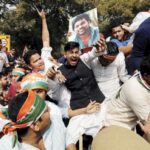Ashfaque EJ: Through the state highway of Kerala, an NIA vehicle was passing at around 4 am, on 29 December 2022, accompanied by a local police vehicle. A Few metres after the vehicle took a right turn to the gutter road through the rural landscape and stopped in front of a two-storeyed concrete house in a village, where everyone was asleep except the white-coloured herons who sought refuge at branches of the nearby tree.
The officers, who stepped out of the vehicle, walked to the main door of the house and knocked on the door as the doorbell was not functioning. Anvar*, a former Popular Front of India activist, and his wife were sleeping peacefully inside the house. As they got no reply, the local police officers walked near the bedroom window and started knocking.
The middle-aged lady, who was jolted awake by the sound of knocking initially thought that somebody reached their home during the odd hours to announce death news. She woke up her husband from sleep.
The local sub-inspector introduced himself and asked him to open the door.
“Following the ban of the organisation, I always have this intuition that a raid might soon happen at our house too. Never in my dreams, I thought that today would be the day,” Anvar’s wife said.
Anvar rushed to the door without wearing his shirt. As he was so concerned about not addressing strangers without covering his bare chest, he became so uncomfortable.
According to advocate Tushar Nirmal Sarathi, a lawyer who appeared for many defendants in cases registered in NIA courts, the house raids during the odd hours of the night is the general pattern seen in many cases investigated by the National Investigation Agency.
“Right to privacy is the fundamental right of a citizen. Disrupting the peaceful sleep of a family and entering their bedrooms at odd hours is a violation of their right to privacy,” he said. By terming such raids as “ an encroachment to the fundamental rights of an individual, he added that these acts are legally backed as the issue concerning law and order.
Simultaneously, the officers of the National Investigation Agency, with support from the Kerala Police, conducted raids at 56 places, houses and offices of Popular Front of India former activists across Kerala. The central agency conducted raids at 8 places in Ernakulam, 3 places each in Kozhikode and Thiruvananthapuram, 4 places each in Malappuram and Alappuzha, 6 places in Wayanad and a few other districts.
Following the raid, four members of the banned organisation were taken into custody. According to the media, the raid was intended to unveil the terror funding and criminal conspiracy allegedly hatched by the PFI activists to make the organisation underground even after the ban.
The NIA officers showed Anvar the court order to raid his house and demanded for his cooperation. “The order says that my house will be searched in connection with the Popular Front of India ban case, registered by the NIA Kochi office, and asked to sign the order,” he said.
Meanwhile, mixed emotion was running through the mind of Anvar’s wife. She was afraid that her husband will be taken to jail and she has to wait endless days for his release. Several Popular Front of India(PFI) activists got arrested in Kerala following the ban.
The NIA team, consisting of three officers and two witnesses, a central excise employee and a customs employee, walked Anvar through the office room, dining halls, three bedrooms, and the terrace respectively. The officers did a rigorous search of every nook and corner of the house.
According to Advocate Tushar, to ensure unbiasedness, the witness ideally must be individuals with credibility and well-familiar in the locality. “But in most raids conducted by the NIA, the witnesses are mainly central government employees who are visiting the locality for the first time,” Tushar said. “Their loyalty will be towards the state apparatus and there are even chances of tampering evidence or planting new,” he continued.
Both husband and wife agreed that the officers behaved in a good manner. While the raid was going on, Anvar’s wife was allowed to do her Fajr prayer, cook food, clean the courtyard, and water the plants. However, Anvar argued that this sort of behavior was the result of a set of interventions his organisation and others made in the court.
“Earlier there were many incidents of police barging the houses, trespassing the wall and destroying it, banging doors, and abusing family members while conducting the raid. Due to the efforts of various people challenging such illegal acts at the court, the officers are getting civilized,” Anvar said.
Moments after scrolling through the books stacked on the shelf, the officer’s eye glued to a book titled Jihad, written by Abul Ala Maududi, a prominent Muslim scholar in Indian subcontinent. “Why are you reading such books?,” the officer asked Anvar.
“Why are you not asking me why I read Thakazhi Siva Sankara Pilla’s novel ‘Kayaru’ and Vrutha Manjari. I got such books too, Anvar replied.
Anvar alleged that the officers were busy cherry-picking the books with Islamic connotations. “This is to establish the fact in the public that Popular Front of India and its leaders are on a mission to establish an Islamic state in India. The books will be submitted in the court to substantiate the claim,” he said.
He also feared that there are chances that the officers can plant fake evidence or scribble incriminating content in the books as they were only allowed to sign and scrutinize the front and back page of the book.
The books seized from Anvar’s home include fifteen copies of Prabhodhanam weekly, copies of Thejas fortnightly, ‘Jihad’ written by Abul Ala Maududi, books written by former PFI leaders E Aboobacker and A Sayeed. Prabhodhanam is considered the mouthpiece of Muslim organisation Jama’at e Islami while Thejas was considered as PFI’s publication. “All these books are not banned and available in the market,” Anvar’s wife said.
36-year-old Ismail (name changed), who got to know about the raid from the local masjid during the Fajr Prayer called Anvar’s brother, who lives 50 metre away from the house to get the details. “I rushed to the spot after getting the news about the raid. But the local police officers stopped me the at the gate and told me that the entry is restricted as the raid was conducted by NIA,” Anvar’s brother told Ismail over the phone.
“This is just another gimmick by the state. The organisation was banned two months ago. It’s obvious that none of its workers or leaders will keep any incriminating evidence, if any, at their house,” said Ismail.
However, Advocate Tushar opined that the main intention behind the raid was to induce fear and suspicion in the public. “Surrounding a house with police forces and creating a terror atmosphere in the locality might induce fear and suspicion in the mind of neighbours. Even if the raid got completed within hours, the person who got subjected might have to bear the scar throughout his lifetime,” Tushar said. Tushar have an experience of a raid of similar nature by the Kerala Police in 2015 January regarding a UAPA case.
According to Anvar, the consecutive house raids and the ban on organisation are affecting the business and livelihood of PFI activists and supporters. “There are teachers, businessmen, traders, workers, grocery shop owners, engineers, and farmers among us. Most of our bank accounts got freezed by the government. For example, Campus Front of India former general secretary Rauf Sherif was an NRI businessman. Following his arrest, the investigation agencies created a narrative that he was the man who managed foreign funds for the organisation. They submitted his financial transactions as evidence to substantiate the claim. They freezed his account and he faced a huge loss. An Indian citizen’s right to do business is getting affected,” said Anvar while sharing the ordeals he and his family faced after the ban of the organisation.
Apart from the books, the NIA officers seized an old sim cover, an empty file cover with the title ‘Campus Front National Council’ on it and an android smartphone of Anvar. Advocate Tushar said that there was a case currently under the Supreme Court regarding the seizure of digital devices.
“Smartphone is an integral part of an individual’s life. Their banking system, communication options, education, and research purpose are mainly dependent on it. By seizing their phones, access to all these facilities is getting denied. If the purpose of investigators is to analyse incriminating content in the device, they can either copy the content or clone the phone. Here, it takes many months to return the phone,” said Tushar.
During the raid, a lady officer recorded the name, and personal details of Anvar’s wife and asked her if she was an active member of the organisation and if she had attended any training camps of the organisation.
She asked the lady officer if the news about the raid will be released to the media. The officer replied that the raid was carried out in a confidential manner and even the local police station was notified just prior to the raid.
However, the raids happened at 56 places, including remote locations, were the breaking news in all major news outlets in Kerala. Many TV channels aired visuals of the houses where raid happened. BJP mouthpiece Janam TV and many other YouTube news outlets published news about Muslim police officers leaking the news about the raids to Popular Front sources. As proof, they stated the absence of many Popular Front leaders during the raid in Pathanamthitta district.
Marunadan Malayali, a YouTube web channel infamous for its Islamophobic propaganda, published news saying that NIA had submitted reports in the court about Popular Front Leaders’ connection with various international Muslim militant organisations including Al Qaeda. The video report further stated that central intelligence got the clue that Popular Front is planning to start a new underground organisation collaborating with the Islamic State (ISIS).
“We have seen many examples of media outlets carrying intelligence versions on a person or organisation’s connection with a terrorist organisation. Such stories will play a huge role in manipulating public opinion and many people will believe those versions,” Advocate Tushar said.
The link to the video report has been widely being circulated in social media and various WhatsApp groups without doing fact-checking. Under the comment section of the story uploaded on YouTube, people are asking to kill Popular Front leaders in the encounter and confiscate their properties and many people are demanding actions similar to the bulldozer drive initiated by Yogi Adityanath in UP.
“Both of my children are pursuing medicine. The elder daughter is preparing for her final exams. I am concerned about their academics and relationships. Such maligning propaganda will affect them mentally and further alienate them from their peer groups,” Anvar’s wife said in an anxious tone.
Asked why he and his organisation are getting targeted by the state, Anvar responded: ”Being a Muslim itself is a crime in present-day India. Muslims are getting lynched and their houses getting destroyed in broader daylight. Any kind of effort to mobilise Muslim masses is getting criminalized by the state. Journalists, academicians, and activists are harassed on both online and offline platforms and persecuted by the state for having Muslim names. Although India claims itself as a secular nation, its selective biases towards the Muslim community is questioning the claim.”
While the officers were about to leave the home with a bunch of books and smart phone after winding up the raids which continued for more than six hours, Anvar asked,” Did you find anything incriminating. why are you taking the book?”. “What else can we do? We cannot return with bare hands,” Anvar recalls an investigating officer’s reply.
*Name changed due to request.
Author: Ashfaque EJ is an independent journalist.






